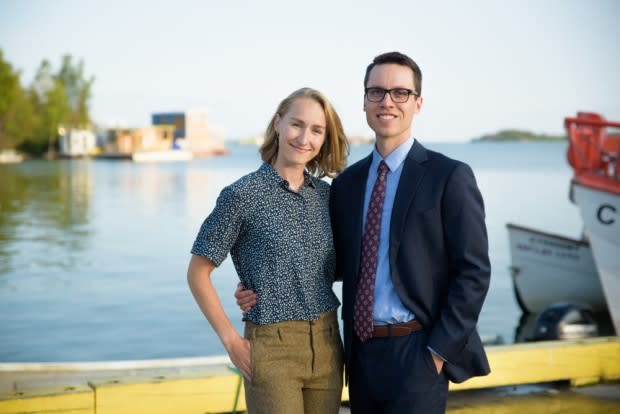Medical students to become first residents in new northern medical residency program
It's an interesting time to start a career as a family doctor in the North, amid the COVID-19 pandemic.
But that might be what Thomsen D'Hont and his fiancé, Kajsa Heyes, will be stepping into.
D'Hont is a Jane Glassco fellow who wrote a policy paper on increasing the number of born-and-raised northern doctors.
Now, he'll be putting his money where his mouth is when he and Heyes join the North's medical community as residents of Canada's first territorial residency program.
D'Hont, who is Métis, was born and raised in Yellowknife and Heyes has lived in the city over the past six years.
Both will soon be graduating from medical school at the University of British Columbia in Prince George (though their program wrapped up a month early) and were recently matched with the University of Alberta's Yellowknife Family Medical Residency Program.
"It's pretty much a dream come true and perfect timing as well in terms of it being the first year of the residency program," D'Hont said.
"When I first went into medical school my goal was to return to the North one day to practice and I think this is a perfect kind of transition."
The match process for a residency program can be stressful, Heyes explained, especially when trying to match as a couple.
Medical students have to rank all the options of programs they're comfortable going to. They ranked about 150 programs, which Heyes says is "low" — some of their friends ranked about 800 program combinations.
"We had a big celebration with our class," Heyes said after they heard they would be paired together in the North. (She noted the celebration took place prior to concerns over COVID-19).
The residency program connects the dots between D'Hont's fellowship project, where among many policy options, he looked at ways to help support Indigenous high school students from the Northwest Territories who are interested in becoming doctors and ways to recruit them back to the North after they graduate from medical school.
"One of the recommendations was for a family medicine residency in the Northwest Territories ... I know there's been a lot of people working on that for a long time," he said.
D'Hont added it was coincidental that it came to fruition at the same time he was set to do his residency.
Licensing 'up in the air'
Heyes said they are both interested in becoming rural general practice doctors.
She said she hopes they can be involved in a broad spectrum of practices during their residency, from working in clinics to working in hospitals, managing chronic illnesses, delivering newborns and launching fly-in clinics so that communities can see a familiar doctor on a regular basis.
Their residency is slated to start in early July in Yellowknife, but with COVID-19 pandemic, which forced their final semester to wrap up one month early and their clinical rotations to be halted, it could affect how they get their license.

"It is kind of an evolving situation where all of the licensing is up in the air," D'Hont said.
"They're figuring out how to give us our final credits because we are off of our clinical rotations right now."
It's also possible the couple could start earlier, in the event their provisional licenses are fast-tracked.
Heyes calls that a "nerve wracking" scenario.
"We're so used to having some degree of supervision, not always, but definitely a certain degree of support that a pandemic does not necessarily allow for," Heyes said.
"I think that's kind of lit a fire under many of us."

